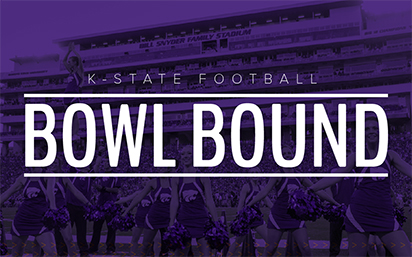At K-State
December 2019
General
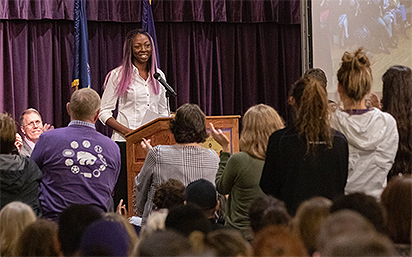
Moving forward together with KSUnite 2019
Francisco Cardoza has a clear memory of the first KSUnite gathering on the K-State
campus.
It was a cool, cloudy day in 2017. Cardoza — currently a senior in management information
systems and president of the Hispanic American Leadership Organization (HALO) — remembers
following the large crowd to Anderson Hall lawn. There, he found a sea of purple,
as people joined together to express their love for the university and their commitment
to diversity and inclusion.
“K-State took a stance that day by deciding to cancel classes…to stand against hate,”
he said.
He challenged the university to see KSUnite as more than just one day — it should
be an ongoing mission, to make sure that all voices at K-State are heard, and that
everyone on campus feels safe and respected.
K-State hosted the third annual KSUnite gathering Nov. 6 at the K-State Student Union.
The event included guest speakers, as well as breakout sessions on topics such as
accessibility, immigration, religion and social justice.
“We chose KSUnite as a visible pledge and an act of engagement,” K-State President
Richard Myers ’65 said of the annual event. “We have a lot to be proud of, and we
want to continue to make progress. We stand united against all forms of discrimination.”
He shared that progress continues on K-State’s Morris Family Multicultural Student
Center, which is currently under construction. The center’s mission is to provide
a space for students of all backgrounds to collaborate and support intercultural learning.
A new point of view
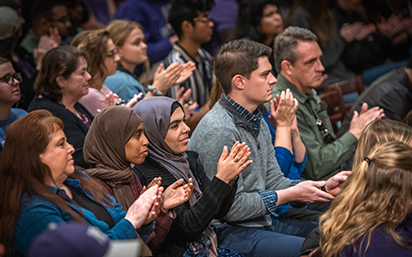 Speakers at KSUnite urged K-Staters to listen, discuss, consider new points of view
and ask questions.
Speakers at KSUnite urged K-Staters to listen, discuss, consider new points of view
and ask questions.
Provost and Executive Vice President Charles Taber recommended that students, faculty
and staff look for inequalities in opportunity that may exist on campus and in the
community, and to promote accessibility for all.
“All of us can contribute to a more just world and a more inclusive campus,” he said.
Jansen Penny, student body president and senior in industrial engineering, said that
coming to K-State gave him an opportunity to experience new perspectives.
“This was the first time I got to experience my own privilege,” he said. “We all have
an opportunity on a daily basis to be a change-maker.”
In addition to Cardoza and Penny, several other students also gave testimonials about
their K-State experiences:
- Lindsay Gutierrez, senior in geology, spoke about her military background and utilizing the Student Access Center.
- Gloria Mutiri, K-State Volleyball player and junior in mass communications, spoke about the discrimination she experienced growing up and the pride she now takes in embracing who she is.
- Mohammad Khan, junior in biology, spoke about his experiences as a Muslim in the U.S.
- Polina Nations, junior in social work and gender, women and sexuality studies, spoke
about sexual violence, and how survivors deserve to be heard and believed.
The keynote speaker was Judge Maritza Segarra ’84. Judge Segarra was the first woman
to ever sit as a District Court Judge in the 8th Judicial District and was the first
Latina ever named as a District Court Judge in the state of Kansas.
“This is such a big step in eroding that type of discrimination,” she said of KSUnite.
“If you weren’t wanting that change, you wouldn’t be here.”
Learn more about the 2019 event.
(Photo of Gloria Mutiri, courtesy of K-State Athletics)
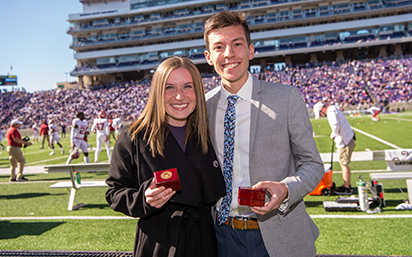
Meet the new K-State Student Ambassadors
Sam Bond and Chaz Corredor waited on the field during halftime at the K-State Homecoming
football game to see whose names would be announced as the new 2020 K-State Student
Ambassadors.
As part of Homecoming earlier that week, K-State students voted on two candidates
to represent the student body at K-State Alumni Association events and university
activities throughout the year.
Walking out onto the football field is an exciting experience on its own, but the
moment was made even more special for Bond and Corredor when they heard the announcer
call their names.
After the announcement, there was a flurry of excitement — smiling, hugging and crying
tears of joy. There would be a lot of hard work ahead, but for now it was enough to
just bask in this moment.
“Being on the field and hearing my name being announced to almost 50,000 people was
definitely something out of a dream for me,” Bond said. “I was already so grateful for the experience of participating in so many fun activities
during Homecoming week, but being able to further my love for K-State by being announced
as the 2020 female ambassador is something I will never forget. I am so thankful for
the friends that helped support me and affirm me in wanting to apply for ambassador
and I am extremely thankful for the K-State Alumni Association for their kindness
and efforts in connecting to students like me.”
“It was honestly such a surreal moment being on the field during halftime,” Corredor said. “To be rewarded with this opportunity after a couple stressful weeks of interviews
and speaking events was a moment I will truly never forget.”
Sam Bond is a junior in human development and family sciences from Olathe, Kansas,
and Chaz Corredor is a junior in finance from Lenexa, Kansas.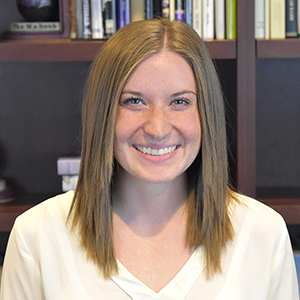 Bond said she decided to run for ambassador because of her past experience working
for the university and spending time with the 2019 Student Ambassadors, Maddy Mash
and Tel Wittmer.
Bond said she decided to run for ambassador because of her past experience working
for the university and spending time with the 2019 Student Ambassadors, Maddy Mash
and Tel Wittmer.
“Being able to see how much energy and effort is put into each student that walks
through our front doors has inspired me to continue that value in my own life and
what I want to further in my leadership at K-State,” she said. “Seeing how passionate
Maddy and Tel have been with their position as ambassadors has been an inspiration
for me. I want to radiate that same character and positivity on this campus for new,
current and graduating students.”
She is passionate about K-State because of the community feeling the university has.
“K-State is important to me, because of how students are genuinely treated and put
first by staff and community members,” she said. “The minute a new student steps on
this campus they are treated as a member of the family and community — that is why
I love this school and bleed purple every day.”
Learn more about Sam Bond. 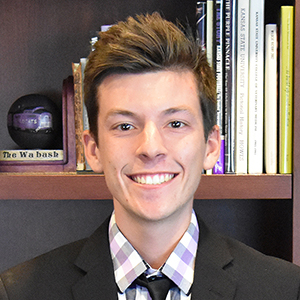 Corredor said he wanted to run for ambassador in order to help other students have
the same positive experience at K-State that he’s had.
Corredor said he wanted to run for ambassador in order to help other students have
the same positive experience at K-State that he’s had.
“I’ve had the experience of a lifetime as a K-State student, and I want others to
experience exactly what makes K-State so great,” he said. “I can think of no role
that provides valuable opportunities to interact with past, present and future students
more than ‘K-State Student Ambassador.’”
He is thankful to K-State for giving him a sense of purpose and belonging.
“The people I’ve met in my classes and in my campus organizations have pushed me to
become who I am today,” he said. “I can’t believe I’m already closer to the end of
my K-State journey than the beginning, but I’m confident future generations at K-State
are sure to experience what I’ve been fortunate enough to find here.”
Learn more about Chaz Corredor.
Each year a male and a female student ambassador are elected to spend the year attending
alumni and campus activities, speaking to alumni, friends, and current and prospective
students. The ambassadors serve a one-year term, and each receives a $1,500 scholarship,
clothing from Borck Brothers and the official K-State ring from the Alumni Association.
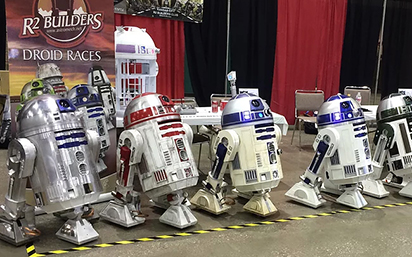
The Force is strong with these K-State droid builders
The very first film Mike Gruhala ’00 remembers watching was a little movie called
“Star Wars” on his family’s brand-new faux wood veneer VHS player.
“As a young kid, those first few minutes really had me hooked on the franchise and
the movie genre itself,” he said. “Sometime afterwards, I ran across a documentary
on TV about the ‘Making of Star Wars’ and how it dealt in detail with the concepts
of stop motion photography and especially the construction of movie model props. I
had no idea that people actually made those models in a shop, from everyday materials,
and it seemed like something I could do.”
As it turns out, it was something Gruhala could do — the K-State grad is now a member of the Kansas City chapter of the R2 Builders Club, a group dedicated to building realistic, life-size replicas of the droids from the
Star Wars franchise.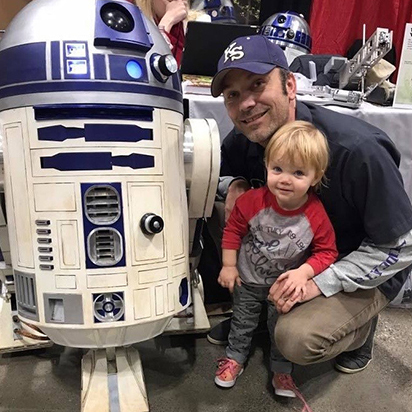 Gruhala decided one day that he needed a hobby which encompassed his wide range of
interests: construction, electronics, science fiction and architecture. He was an
architecture major at K-State.
Gruhala decided one day that he needed a hobby which encompassed his wide range of
interests: construction, electronics, science fiction and architecture. He was an
architecture major at K-State.
“After a few failed attempts of restoring an old sports car, I somehow decided upon
building a 1:1 scale fully remote control R2-D2,” he said. “I eventually stumbled
upon a website that contained thousands of members from around the globe who had already
began (and some of whom had finished) building a droid of their own. I eventually
discovered that some members of this group had gained access to the actual filming
prop, which allowed the group to have vital dimensions and color matches to the droid(s)
used on film.”
He found two other builders in Kansas City area, and they were able to share information
and advice on electronics and construction. Gruhala said the group has since grown
to more than 10 local builders, who regularly attend local charity and public outreach
events together.
“I really enjoy tinkering around with it,” he said of his droid project. “Whether
it’s upgrading electronics, reworking parts for better durability or trying to clean
up the spaghetti mess of wires that are concealed deep within R2’s body, it seems
very similar to my original idea of rebuilding an old sports car — just a bit smaller
and less expensive.” Fellow K-Stater Kevin Schwarz ’12 eventually found his way into the club, as well.
Fellow K-Stater Kevin Schwarz ’12 eventually found his way into the club, as well.
“I have a friend who is in other Star Wars costuming groups, the 501st and the Rebel
Legion,” said Schwarz, who majored in computer science. “He was planning on building
a screen accurate C-3PO costume. R2 has always been my favorite so I thought it would
be cool to have R2 and 3PO together. He pointed me to the worldwide astromech.net website and not long after I found the local builders.”
Schwarz said his favorite part of building his droid was right after he got the motors
working.
“When R2 starts moving it really feels like he comes alive, and being able to watch
people interact with R2 has been awesome,” he said. “I actually found building the
legs and feet to be the most challenging. Most of my R2 is made from plastic that
I had to cut by hand. The legs and feet support R2’s weight so getting them right
is pretty important.”
So far, R2-D2 has been his favorite droid build, but he also has a MSE-6 (Mouse) droid
and he is working on a BB-8 build.
“I had to learn a few new skills to build R2, and that learning process was pretty
fun,” Schwarz said.
Star Wars on campus
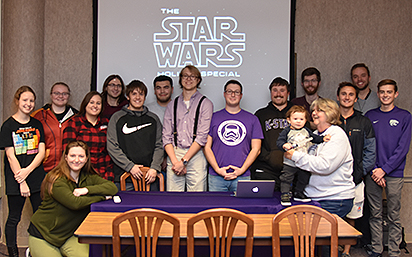 The K-State grads in the Kansas City R2 Builders Club aren’t the only Wildcats with
a passion for a certain galaxy far, far away. K-State has its own Star Wars Club for
students on campus.
The K-State grads in the Kansas City R2 Builders Club aren’t the only Wildcats with
a passion for a certain galaxy far, far away. K-State has its own Star Wars Club for
students on campus.
Since it started three and a half years ago, the KSU Star Wars Club is one of the
fastest growing clubs on campus, said Zach Perez, K-State sophomore and the club’s
outreach manager.
He grew up loving Star Wars and joined the club his freshman year. He spotted the
club’s booth at a campus activities fair, an event he was covering for the Kansas State Collegian.
Club members meet to discuss the Star Wars universe and also host watch parties. Perez
said it’s a fun, informal environment where everyone is welcome to come and celebrate
Star Wars.
“I’ve kind of found my spot — it’s definitely a de-stressor for my week,” Perez said.
“We’ve definitely made a family here.”
Keep up with all of the club’s adventures by following them on Twitter.
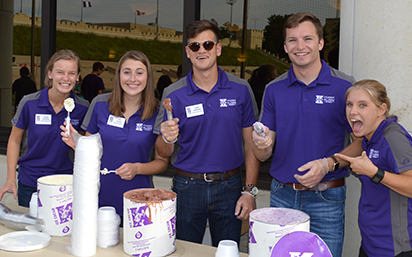
K-Staters reflect on lessons learned from Student Alumni Board
Although he now serves as president of K-State’s Student Alumni Board, Keaton Petite
wasn’t always sure that he would attend K-State.
“My sister was extremely involved here, and I wanted to go somewhere I could make
a name for myself,” he said. “The reason I stayed was because of the people I encountered
on my visit and the alumni I spoke with while I was in Manhattan. I joined Student
Alumni Board because it gave me the opportunity to make the same impact on prospective
students while also staying engaged with both current students and alumni. SAB is
the only organization on campus that works with all three types of K-Staters and that’s
a unique experience you can’t get anywhere else.”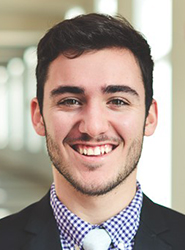 The K-State Alumni Association’s Student Alumni Board, or SAB, is a professional group
of 35 passionate students who enhance the K-State experience by creating a link between
the Alumni Association and past, present and future students. The program also offers
students a chance to learn valuable skills that can help them both in the classroom
and later on in their careers.
The K-State Alumni Association’s Student Alumni Board, or SAB, is a professional group
of 35 passionate students who enhance the K-State experience by creating a link between
the Alumni Association and past, present and future students. The program also offers
students a chance to learn valuable skills that can help them both in the classroom
and later on in their careers.
“My definition of what a leader is has changed and my definition of what a friend
is has changed over my three years being on Student Alumni Board,” Petite said. “I
attribute that to the leadership I’ve had and the opportunities that have been presented
to me.”
Growing as a leader
So far, Petite said that SAB has taught him the importance of communication and has
helped him realize that “facts and figures can only get you so far.”
“When working with prospective students, they don’t want to hear about K-State’s ranking
on happiness or our faculty to student ratio,” he said. “Students want to hear about
the experiences we’ve had at K-State and how those experiences have impacted our lives
for the better. It’s about being personal and relatable.”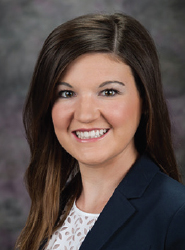 Past Student Alumni Board president Taylor Fry ’17 said that serving on SAB taught
her how to adapt.
Past Student Alumni Board president Taylor Fry ’17 said that serving on SAB taught
her how to adapt.
“Through SAB you are constantly interacting with all types of people, ranging from
alumni to prospective students or from staff members to fellow SAB members,” she said.
“They all have different expectations and communication styles. Being able to adapt
to meet others at their level was an important skill to learn in order to keep progressing
forward while also fostering relationships.” She lists some of her favorite SAB memories as traveling to Washington, D.C., for
the CASE ASAP conference and touring D.C. in a Powercat labeled limo thanks to past
K-State Alumni Association board of directors member Carolyn Jackson ’75, ’81; working
the University Lounge during football games; and dancing at the Wabash CannonBall.
She lists some of her favorite SAB memories as traveling to Washington, D.C., for
the CASE ASAP conference and touring D.C. in a Powercat labeled limo thanks to past
K-State Alumni Association board of directors member Carolyn Jackson ’75, ’81; working
the University Lounge during football games; and dancing at the Wabash CannonBall.
Fry works for the American Royal Association as a project coordinator and said she
sees many parallels between her job and her SAB experiences.
“SAB helped prepare me to handle the uncertainty that comes with new tasks, juggle
multiple responsibilities at one time, communicate and work with a variety of personalities
and backgrounds, and learn from those around me,” she said. “Looking back, I gained
a lot of valuable experience from SAB — it was definitely a top highlight of my college
career and one that I will always be very thankful for.”
From college to career
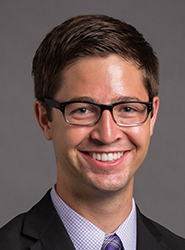 Fellow past SAB president Adam Wilkerson ’16 also has fun memories from the Wabash
CannonBall event, and said he always enjoyed SAB retreats, which offered the perfect
balance of work and fun.
Fellow past SAB president Adam Wilkerson ’16 also has fun memories from the Wabash
CannonBall event, and said he always enjoyed SAB retreats, which offered the perfect
balance of work and fun.
He credits SAB for teaching him how to better plan and execute events.
“Events designed for high schoolers and alumni involve similar behind the scenes planning
but the visible approach and execution is variable and requires understanding the
intended audience,” he said.
Wilkerson currently works as a civil engineer at Burns and McDonnell in the aviation
and federal group. He assists with master planning and the designing of projects for
airports and federal clients. SAB helped him make connections that are now paying
off in his career.
“One of the first days on the job, I re-met the VP of my group who was on the Wabash
CannonBall planning committee,” he said. “We first met at the CannonBall and stayed
in touch so when I started, he took the time to welcome me to the group. The friends
I find myself running into the most at events throughout Kansas City are fellow SAB
members.”
Do you know a K-State student who would make a great member of the K-State Alumni Association’s Student Alumni Board? Learn more about what it takes to apply!

Path to progress: Lecture series promotes dialogue
Messages kept popping up on Dwane Roth’s phone, but they weren’t from his family or
persistent marketers — they were from the soil water sensors on his farm in western
Kansas.
Roth farms with his nephews near Holcomb, Kansas, using water from the Ogallala Aquifer
to irrigate their land. For years, Roth thought he was doing a good job of using progressive
water conservation techniques to reduce water usage, improve the soil and generally
conserve the land. Then he went to hear Jay Famiglietti, a hydrology scientist, give
a lecture at Kansas State University.
Famiglietti was the fourth speaker invited to K-State through the Henry C. Gardiner
Global Food Systems Lecture Series, which has been hosting world-renowned leaders
in climate, agriculture and global foods research since 2013. Hearing Famiglietti
talk about the depletion of underground water around the United States and the world,
and the importance of reversing that trend to preserve water for future use, Roth
doubled down on his conservation efforts.
“I knew we farmers had to do something to better conserve water,” Roth said. “I saw
on the K-State website that this world-renown hydrologist, Jay Famiglietti, was coming
to give a lecture, so I decided to go find out how to solve this problem. Before this,
I said I would never spend $1,400 on a soil water monitor, but now I have them everywhere.
I don’t even want to start an irrigation pivot if we don’t have one on there. That’s
how this thing took off from the global food lecture.”
Since attending the Gardiner lecture in 2016, Roth has implemented technology that
has cut down his water usage and improved the health of his soil. He has become passionate
about preserving land and water for future generations, attending conferences around
the country and inspiring the next generation of conservationists.
His daughter, Grace, focused on water advocacy and awareness as her FFA supervised
agricultural experience project her freshman year in high school. This project grew
into the Kansas Youth Water Advocates, which is supported by K-State, the Kansas Department
of Agriculture, the state FFA office and other agricultural organizations.
The Henry C. Gardiner Global Food Systems Lecture Series began in 2013 as a way to
honor a pioneer in livestock breeding and agriculture.
“My dad, Henry, was passionate about education and lifetime learning,” said Mark Gardiner,
a 1983 K-State alumnus. “As a beef producer, he was never satisfied with average.
Henry was committed to research and progressive dialogue with anyone sharing similar
objectives. His theories weren’t always popular. He was committed to proving or disproving
theories, recognizing that sustainable, repeatable results were the hoped for outcomes.
“He knew the pathway to progress was through objective dialogue, interaction with
folks that didn’t always agree but were focused on the same end goal — to breed better
beef cattle or to become better stewards of the land. Our goal with this lecture series
is to sustain Henry’s philosophy of passionate learning that leads to better outcomes.” Read more
Combating waste at K-State
 A big question on most minds today is how we can help future generations. The Kansas
State University recycling center has an answer for that; it has been working to reduce
waste since 2013.
A big question on most minds today is how we can help future generations. The Kansas
State University recycling center has an answer for that; it has been working to reduce
waste since 2013.
“Recycling is important because we are trying to divert as much material from entering
the landfill to be used in other areas,” said Bill Spiegel, project manager for K-State
recycling.
Recycling links almost every part of K-State’s campus, from the blue bins outside
and inside most classrooms, to the recycling facility for the K-State community.
“We offer a convenient place to drop off all recyclable material 24/7, whether you
are a student or a faculty member of K-State, or support the recycling program here,”
Spiegel said.
The K-State recycling center team is passionate about saving the planet, one can at
a time, and works with campus departments to ensure that old recyclable materials
find new beginnings.
One of the biggest events for the recycling center involves the students moving in
and out of the dorms. This is the time for all students to look and see what they
do not want or need to take home and — if they choose — donate to the recycling center.
“Move out items can include anything from clothes, books, household items, non-perishable
food, paper, cardboard, plastics and aluminum cans,” said Spiegel. This long list
of items are things that most students forget can be recycled once they leave for
the summer.
All the extra clothes that are recycled during move in and move out are given to the
local Goodwill. The bedding is given to the T. Russell Reitz Animal Shelter in Manhattan
to provide extra comfort to the animals. All unopened nonperishable food is donated
to Cats’ Cupboard for student use.
This helps students to relieve the stress of cramming all their items back into their
cars for the ride home and benefits the local community.
Recently the center worked with the Housing and Dining services to recycle 582 mattresses.
The coordinator found an organization in the Greater Kansas City area that agreed
to pick up, sanitize and redistribute these mattresses to children in need. This all
happens with no extra cost to the university. Read more
College News
Agriculture
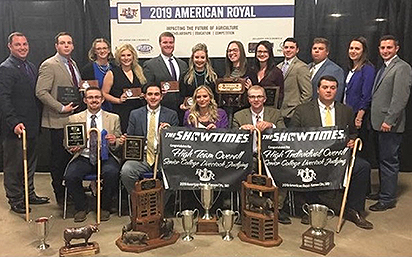
Livestock judging team brings home American Royal National Championship
The K-State Livestock Judging Team was honored as the Champion Team Overall in the
American Royal Intercollegiate Judging Contest on Oct. 25 in Kansas City, Missouri.
The team was first named champions in the beef, sheep and goat and oral reasons divisions.
Nearly 30 university teams competed in this year’s event, with K-State outdistancing
Oklahoma State, Texas Tech and Texas A&M, who finished second through fourth, respectively.
The team is coached by Chris Mullinix ’96 and assisted by K-State Department of Animal
Sciences and Industry graduate student Payton Dahmer ’19.
Team Results:
Champion Team Overall
High Team Sheep & Goats
High Team Beef
High Team Oral Reasons
Team Members:
Adrian Austin, Mt. Vernon, Illinois; Claire Bradbury, Winfield, Kansas; Cooper Carlisle,
Ropesville, Texas; Kaylee Farmer, Nevada, Missouri; Kaci Foraker, Burrton, Kansas;
Adrianna Gasper, North Vernon, Indiana; Keayla Harr, Jeromesville, Ohio; Cade Hibdon,
Princeton, Kansas; Kaitlyn Hildebrand, Ohio, Illinois; Samuel Lawrence, Avilla, Indiana;
Cole Liggett, Dennison, Ohio; Michael Loughridge, Chatsworth, Georgia; Megan Marion,
Terre Haute, Indiana; Brady McComb, Pratt, Kansas; Justin Nofziger, Wauseon, Ohio;
and Hadley Schotte, Marysville, Kansas.
Photo: The K-State Livestock Judging Team, which earned Champion Team Overall honors at the
American Royal Intercollegiate Judging Contest on Oct. 25 in Kansas City. (Courtesy
photo)
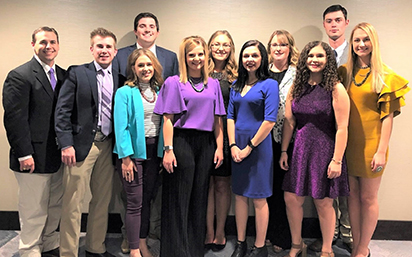
Meat judging team named Reserve National Champions – with three All-Americans
For the first time, K-State’s Meat Judging Team had three All-American students in
the same year while also earning the title of Reserve National Champions in its final
event of the year on Nov. 10.
The All-Americans are Lane Egger (first team), Michaela Musselman (first team) and
Hannah Williams (second team). With their teammates, they placed second at the International
Intercollegiate Meat Judging contest, earning the Reserve National Champions title,
in Dakota City, Nebraska.
K-State finished behind Texas Tech University and ahead of Texas A&M, Oklahoma State
and Colorado State.
In total, 89 students representing 12 institutions competed in the contest.
This contest marked the end of a successful year for the meat judging team, with the
team having first-place finishes at the Eastern National and Iowa State Contest; second-place
finishes at the International, American Royal, Southwestern, Houston Livestock Show
and Rodeo Contest, and Barrow Show; a fourth-place finish at the National Western;
and a fifth-place finish at the High Plains Contest.
The team is coached by Travis O’Quinn.
Team Results:
2nd High Team Overall
2nd High Team in Reasons
2nd High Team in Beef Grading
2nd High Team in Total Beef
2nd High Team in Specifications
3rd High Team in Beef Judging
4th High Team in Lamb Judging
4th High Team in Pork Judging
5th High Team in Placings
Team members include:
Greyson Collins of St. John, Kansas; Kimmi Doran of Whiteford, Maryland; Lane Egger
of Columbus, Nebraska; Katie Lybarger of Garnett, Kansas; Jake McCall of Greenville,
Virginia; Michaela Musselman of Clay Center, Kansas; Luke Prill of Wichita, Kansas;
Hannah Seymore of Visalia, California; Adelyn Smith of Corinth, Texas; Cheyenne Swoope
of Kilgore, Texas; and Hannah Williams of Kearney, Nebraska.
Photo: The K-State 2019 Meat Judging Team earned the title of Reserve National Champions
on Nov. 10 at the International Intercollegiate Meat Judging Contest in Dakota City, Nebraska. (Courtesy photo)
Architecture, Planning and Design

Kansas landscape architect transitions to international organization’s past president
Philip J. Meyer ’85 has transitioned to past president and chair of the Leadership
Advisory Council for the Council of Landscape Architectural Registration Boards (CLARB)
after concluding his one-year term as president of the organization. He will serve
in these roles through Sept. 30, 2020.
As president, Meyer focused on leading the board in strategy, foresight and diversity
initiatives, as well as leading the search committee for a new chief executive officer
to lead the organization’s staff and partnerships.
The CLARB Leadership Advisory Council (formerly Committee on Nominations) is responsible
for identifying and vetting candidates for CLARB leadership to ensure the organization
has the most effective, qualified individuals to lead them toward their organizational
goals. The council is also responsible for identifying opportunities to improve and
enhance nominations and elections processes and procedures and encouraging participation
of all members in the elections process.
Previously for CLARB, Meyer served as president (2018-2019), president-elect (2017-2018),
vice president (2016-2017), secretary (2014–2016), Region 4 director (2011–2014) and
Region 4 alternate director (2008–2010).
He has been active with CLARB since 2003 as the chair of a task force on friction
in the licensure system analysis, co-chair of the model law updates and as a member
of the by-laws review committee, a grader for exams and as a member of the Committee
on Nominations.
For the state of Kansas, Meyer is a past member of the Kansas Board of Technical Professions.
He has served as chair, vice-chair and secretary for the board and twice served as
chair of the Architect, Landscape Architect and Geologist Sub-Committee. He has also
served the board by being a member of disciplinary hearing panels, the complaint committee,
the continuing education committee and other special focus committees.
Closer to home, Meyer is chair of the City of Wichita Design Council, a member of
the Wichita Area Builders Association and is active with volunteer opportunities throughout
the community. Meyer works as a vice president at Baughman Company PA, a multidisciplinary
development firm in Wichita.
Meyer earned a bachelor’s degree in landscape architecture in 1985 from Kansas State
University. He is currently licensed in Kansas, Missouri and Oklahoma. He is also
a CLARB Certified landscape architect.
About CLARB
Since 1970, CLARB has been dedicated to ensuring that all individuals who affect the natural and built environment through the practice of landscape architecture are sufficiently qualified to do so. CLARB works to protect the public’s health, safety and welfare by establishing and promoting professional licensure standards for education, experience and examination required for the profession of landscape architecture.
Arts and Sciences

Psychology and English GTAs earn graduate student teaching excellence awards
Two graduate students have been awarded the GSC Award for Graduate Student Teaching
Excellence, sponsored by Kansas State University’s Graduate Student Council.
The master’s graduate teaching assistant award winner is Katie Cline, master’s student
in English, Jacksonville, Alabama. Her adviser is Phil Nel, university distinguished
professor of English. The doctoral graduate teaching assistant award winner is Tucker
Jones, doctoral candidate in psychology, Alamosa, Colorado. His adviser is Mark Barnett,
professor of psychological sciences.
The GSC Award for Graduate Student Teaching Excellence recognizes graduate teaching
assistants who have excelled in classroom teaching. The awards promote the important
contributions graduate students make to the scholarship of the university.
Cline and Jones will represent the university for the Midwestern Association of Graduate
Schools, or MAGS, Excellence in Teaching Award, with a winner selected at both the
master’s and the doctoral levels. Since the teaching award was established in 2011,
K-State has had six winners, the most from any university.
Both Cline and Jones received a $500 scholarship and their names and departments are
engraved on a perpetual plaque displayed in their departments until the next awards
are given.
“Katie and Tucker are outstanding examples of the quality of teaching and mentoring
that our graduate teaching assistants provide K-State undergraduates,” said Carol
Shanklin, dean of the Graduate School. “Our GTAs contribute to enhancing the undergraduate
experience while gaining valuable experiences that will increase their competitiveness
for future positions. I am honored that they will be representing our GTAs as K-State’s
nominees in the Midwestern Association of Graduate Schools competition this spring.”
“Teaching is important to me because it isn’t just time spent in a classroom; we remember
our school experiences, for better or for worse, and we carry those experiences with
us for the rest of our lives,” Cline said. “Some of the most influential people in
my life have been teachers, and I strive to bring their sincerity, kindness, spirit
and even their corny jokes to every classroom I enter.”
Jones said teaching provides him with an opportunity to have a meaningful impact on
the lives of others.
“I have had some amazing teachers throughout my life, and I owe so much to these incredible
individuals,” he said. “Teaching provides me with an opportunity to pay homage to
those who have contributed to my educational journey as well as pay it forward to
the next generation of learners.” Read more
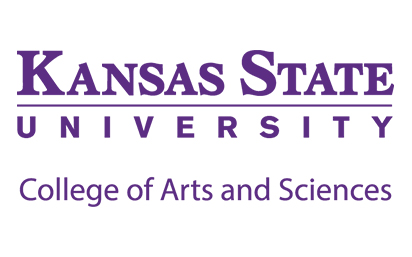
Collegian Media Group publications, students earn honors in national competition
Students from Kansas State University’s Collegian Media Group brought home 12 national
awards from the recent Associated Collegiate Press/College Media Association convention
in Washington, D.C.
The 2018 Royal Purple yearbook was one of three in the nation to be named a Pacemaker, the highest award
given by Associated Collegiate Press, which also recognized the 2019 Royal Purple with third place in the Best of Show competition.
The College Media Association recognized the Royal Purple with a second place in the yearbook of the year competition. The Royal Purple also received first and second places for best yearbook entertainment spread; second
place for best yearbook cover; and honorable mention for best photo package from the
association, and in the Pinnacle awards, the Royal Purple was awarded best yearbook sports spread.
The Associated Collegiate Press recognized the Royal Purple with best yearbook cover and best yearbook spread honors, and an honorable mention
in sports photography.
The Collegian, K-State’s student newspaper, earned honorable mentions from the Associated Collegiate
Press for editorial writing and feature photography, while the Manhappenin’ Magazine staff was recognized with the best magazine sports spread.
“Bringing back so many awards just validates what we are doing with the Royal Purple,” said Ashley Read, 2020 Royal Purple editor. “It proves we are doing good work and it motivates us to do more to make this
year’s book even better for the student body and to win more awards next year.”
The following K-State students were responsible for awards listed above:
- Alex Todd, December 2018 bachelor’s graduate in information systems, Andover, Kansas, second place for best yearbook cover and honorable mention for best yearbook photo package from the College Media Association, and honorable mention in feature photography from the Associated Collegiate Press
- Rafael Garcia, May 2019 bachelor’s graduate in mass communications, Emporia, Kansas, honorable mention in editorial writing from the American Collegiate Press
- Kyle Hampel, May 2019 bachelor’s graduate in English, Garden City, Kansas, honorable mention in editorial writing from the American Collegiate Press
- Emily Lenk, senior in mass communications, Garden City, Kansas, best yearbook sports spread in the Pinnacle awards
- Olivia Bergmeier, junior in mass communications, Hutchinson, Kansas, honorable mention for best yearbook photo package from the College Media Association
- Katie Harbert, junior in agricultural communications and journalism, Kingman, Kansas, second place for best yearbook entertainment spread from the College Media Association
From Greater Kansas City:
- Olivia Rogers, senior in political science and pre-law, Gardner, honorable mention in editorial writing from the American Collegiate Press
- Meg Shearer, junior in mass communications, Kansas City, second place for best yearbook entertainment spread from the College Media Association
- Logan Wassall, junior in mass communications, Overland Park, first place for best yearbook entertainment spread from the College Media Association and honorable mention in sports photography from the Associated Collegiate Press
From out of state:
- Ashley Read, junior in fine arts, Austin, Texas, first place for best yearbook entertainment spread and second place for best yearbook cover from the College Media Association
Business Administration
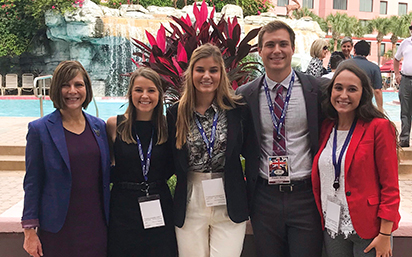
K-State Sales Team brings home top individual honors from International Collegiate Sales Competition
The Kansas State University Sales Team brought home the top honor in individual placings
for the third year in a row at the International Collegiate Sales Competition. Hosted Nov.
6-9 by Florida State University in Orlando, the competition had 180 competitors from
90 universities competing.
The K-State Sales Team had two students compete in the competition. The team consisted
of Preston Maurer, senior in finance, and Cecilia Nancarrow, junior in professional
strategic selling, both from Overland Park, Kansas.
Lanessa Aurand, senior in professional strategic selling and marketing, Belleville,
Kansas, and Abbie O’Grady, senior in professional strategic selling and marketing, Overland Park, Kansas,
traveled with the team as student coaches to help prepare the team for the competition.
The two competitors participated in the role-play event, which is a tournament-style
competition consisting of four rounds. The role-play scenario is similar to a real
complex selling situation where needs are developed in early meetings leading to a
solution presentation and final purchase decision. The scenario always includes some
aspects of international business. Nancarrow took first place individually out of
180 competitors. Maurer was a semifinalist placing in the top 20 competitors.
“I’m very proud of our students and their performances!” said Dawn Deeter, director
of the National Strategic Selling Institute and sales team coach. “Cecilia and Preston
worked incredibly hard to prepare for the role-play competition. Abbie and Lanessa
competed in a case simulation and speed selling, while also serving as student coaches. They
worked well together as a team and I think that made the difference.”
The K-State Sales Team is in the College of Business Administration’s National Strategic
Selling Institute, which has been named one of the top sales programs in the country
for eight straight years by the Sales Education Foundation. The team consists of students
who are enrolled in the certificate or major in professional strategic selling.
Last fall, K-State became just the 19th university in the U.S. to offer a major in professional strategic selling. Students can also earn a certificate in professional strategic selling, which is open to all majors at the university. The professional strategic selling
program introduces students to the fundamentals of sales and through the innovative
curriculum and sales labs allows students to develop the skills needed to be successful.
The K-State Sales Team will compete in several competitions throughout the school
year across the country. For more information on the National Strategic Selling Institute
or the K-State Sales Team, please contact kstatesalesprogram@ksu.edu.
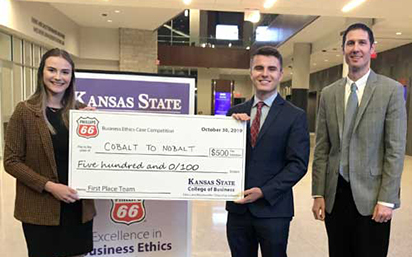
Phillips 66 Business Ethics Case Competition awards $5,000 to K-State business students
The Kansas State University College of Business Administration recently awarded $5,000
in scholarship money to 19 students as a result of the 2019 Phillips 66 Business Ethics
Case Competition.
A total of 274 students representing 80 teams entered the competition, which was organized
by the college’s Ethics and Responsible Business Citizenship Initiative and sponsored
by Phillips 66.
Students were challenged to examine a real-world ethical dilemma and were responsible
for analyzing the situation, applying appropriate ethical and strategic management
principles, and developing a viable set of practical recommendations. After a contingent
of faculty in the Department of Management evaluated the initial written analyses,
six teams were selected to compete in the final round where they presented their analysis
and recommendations to a panel of judges.
“This competition provides a unique opportunity for our students to improve their
analytical, decision-making and presentation skills,” said Bill Turnley, Sam and Karen
Forrer Chair of Business Ethics and head of the Department of Management. “The finalists’
presentations were very compelling, with recommendations that were well justified
and that did a nice job of balancing strategic and ethical concerns. We appreciate
the support from Phillips 66 that makes this competition possible.”
“Phillips 66 is proud to support the Business Ethics Case Competition and encourages
the thoughtful discussion around the way corporations should operate today,” said
Seth Sanders ’05, Phillips 66 supervisor IT F&PA and lead campus recruiter. “The presenting
groups all did a wonderful job! It was great to see K-Staters take a broader, more
holistic view of the corporate purpose and demonstrate how long-term value can be
generated for all stakeholders.”
The winning team was made up of senior in accounting Nathan Hartter, senior in marketing
Kristen Painter and senior in finance Taylor Werner. Each member of the winning team
received $500.
The second place team, which was awarded $350 per team member, was comprised of senior
in management Nicole Bolte, senior in management Makenna Dandurand, senior in management
Jared Grieve and senior in management Natalie Longhurst.
Taking home third place and a $250 each was the team of senior in management Samuel
Hummer, senior in management information systems Rebecca Jenkins and senior in finance
Douglas Kellerman.
Members of the remaining three finalist teams received an honorable mention award
of $150 for advancing through to the final round. Those receiving the honorable mention
designation include senior in finance Tyler Dallam, senior in finance Aaron Gallaway,
senior in finance Olivia Mangual, senior in marketing Kellie Gabriel, senior in management
information systems Kate Gleason, senior in marketing Wyatt Regehr, senior in management
Jacob Schmidt, senior in marketing Karaline Schreiner and senior in management Hannah
Smith.
Education
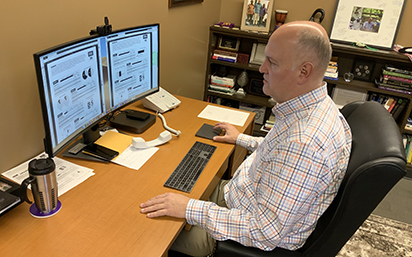
K-State professor co-author of national report on challenges of rural schools
A report detailing a 50-state comparison of rural schools reveals that many rural
students face numerous inequities, and Kansas, like many other states, has both areas
to celebrate and preserve as well as serious issues to address.
Why Rural Matters 2018-19: The Time is Now was published by the Rural School Community Trust in Washington, D.C. Jerry Johnson,
chair of the educational leadership department and Lydia E. Skeen endowed professor
in education at the Kansas State University College of Education, is one of the report’s
authors. The full report can be viewed at www.ruraledu.org.
Nearly one-quarter — 111,000 — of Kansas’ half-million K-12 students are in rural
schools, and 46% of the school districts in the state are deemed rural by the U.S.
Census Bureau. Nearly two-thirds of these districts — 66% — are considered small rural
districts with enrollments below the national median for rural school districts. Nationally,
there are 50.8 million students in public schools and about 20% are in rural schools.
“It should not be necessary to state the importance of the schools serving 1 in 5
U.S. public school students and argue that these schools and their communities matter
— but it is,” Johnson said. “Meeting the needs of 9 million children is a challenge
and a responsibility that deserves the attention of the nation, and this report points
to key issues of policy and practice with the potential to make things better or make
things worse.”
Overall, Kansas ranked in the top third in the nation and was in the top five of the
percent of rural students enrolled in dual credit courses. However, the report revealed
several areas for policymakers and education leaders to address.
Kansas — even when adjusted for comparable local wages — ranked last in rural teacher
salaries and had the 11th highest rate of rural students with individualized education
programs. In other metrics, Kansas had the nation’s fourth-lowest rate of rural students
passing an AP exam, and slightly less than half of Kansas’ high school juniors and
seniors — 47.8 percent — took the ACT or SAT.
J. Spencer Clark, associate professor of curriculum and instruction and director of
the Rural Education Center at Kansas State University, said the report provides clarity.
“The Rural Education Center is strategically positioned to address many of the needs
outlined in this report with our rural partners,” Clark said. “We’re heartened by
the fact that we’re already focusing on college and career readiness for our rural
Kansas students and are looking forward to meaningful discussions on ways to better
prepare our students in light of the report.”
Rural schools are so vital to the success of their communities, the College of Education
hosted the inaugural Rural Summit in 2019. Response was so favorable, Clark said the
summit will be expanded to a regional event in 2020. Details will be forthcoming.
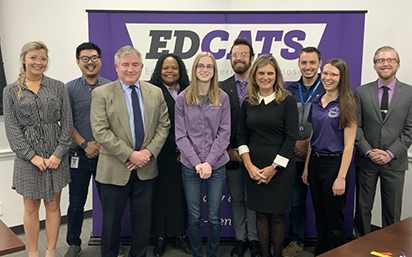
Brown, Chun speak at KSU-NSTA event
National STEM Day provided the ideal opportunity to bring two science education alumni
to campus for the student chapter of the KSU-National Science Teaching Association,
KSU-NSTA, first event of the 2019-20 school year.
Alex Brown ’16, chemistry teacher at Manhattan High School (USD 383), and Subin Chun
’16, chemistry teacher at Junction City High School (USD 475), addressed the 30-plus
students, faculty and district administrators at the Nov. 8 event.
Dean Debbie Mercer ’84, ’88, ’96, ’99 welcomed the students and speakers, and applauded
Kimberly Staples, associate professor of curriculum and instruction and KSU-NSTA faculty
adviser, on what will be a memorable year of activities promoting STEM education.
“Developing effective science teachers of STEM requires an ecosystem comprised of
factors beyond the classroom,” Staples said. “We recognize the role of collaborations
as critical in this process — with K-12 schools, graduate students, our K-State community,
outstanding mentor teachers, NSTA and science organizations, and yes, our alumni in
STEM fields.”
Brown explained his teaching approach.
“One of the things I try to get my students to understand is just because you aren’t
going into science, doesn’t mean STEM isn’t important for you,” he said.
Brown explained STEM courses offer students critical skills — collaborating, problem
solving, putting a plan into action, testing that plan, evaluating outcomes and making
adjustments — and mastering those skills will transfer to any professional work setting.
He also tells his students something surprising.
“It’s OK to be wrong,” Brown told the future teachers. “In science, we are wrong way
more than we are correct. If we quit every time we were wrong the first time, we wouldn’t
have discovered very much of anything.”
Chun discovered he wanted to be a teacher after changing his major three times — first
was pharmacy then biochemistry and finally, science education.
“Switching my major to education was the best decision I have made in my life so far
and it was grounded in the decision to go to K-State,” he said. “I want to give a
shout-out to the program because it made me who I am.”
Chun was featured in the college’s web series “Crash the Class” in September where Staples and the college’s film crew crashed his class by filming
his students and bringing him some classroom supplies from his wish list.
But it was the South Korean conscription program of mandatory military service that
enhanced his ability to connect with his students.
“Prior to accepting this position, I didn’t realize how big of a military community
Junction City had, and I was actually able to relate to my students because of my
prior military background,” Chun said.
Like Brown, he hopes to encourage his students to think.
“My biggest goal that I tell all of my students from day one is ‘I don’t care if you
enjoy science or not,’” Chun said. “Through my class, if I’m able to get you to at
least think that science is actually kind of interesting, I’ve achieved my goal.”
Staples said it was a high-energy event celebrating science education.
“As always, it’s a great day to be a science teacher prepared at Kansas State University.”
Front row:
Jamie Waechter (secretary), Marvin Wade ’95, Sarah Peterson (president), Dean Mercer,
Samantha Pilcher (publicity chair)
Second row:
Subin Chun (chemistry teacher), Kimberly Staples (KSU-NSTA chapter adviser), Mitch
Saffle (philanthropy chair), Alex Brown (chemistry teacher), Jacob Nichols (president-elect)
Carl R. Ice College of Engineering
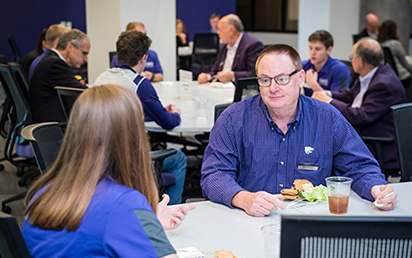
Wiegers invest in naming the Department of Electrical and Computer Engineering
Mike ’82 and Lynn Wiegers of Baldwin City, Kansas, have invested in the naming of
the Mike Wiegers Department of Electrical and Computer Engineering in the Carl R.
Ice College of Engineering at Kansas State University.
At their June 19 meeting, the Kansas Board of Regents approved the naming of the department
in Mike Wiegers’ honor.
This investment will empower the department to recruit and retain top faculty, support
deserving students and provide flexible funding for department leaders to take advantage
of emerging opportunities.
“Providing an outstanding engineering education is a competitive and vigorous endeavor,
requiring investments to equip and train tomorrow’s leaders and innovators in this
field,” said Don Gruenbacher ’89, ’91, ’94, department head and associate professor.
“Mike and Lynn understand this and have stepped forward with exceptional generosity
to meet these needs. It’s fitting that the Department of Electrical and Computer Engineering
will now bear the Wiegers’ name.”
Mike Wiegers earned his degree in electrical engineering in 1982 from K-State and
is now employed as vice president of consumer engineering at Garmin in Olathe, Kansas.
In 2018, he received the K-State Alumni Association Alumni Fellow award. Mike serves
on the College of Engineering Dean’s Advisory Council, and both he and Lynn serve
on the KSU Foundation Board of Trustees. The Wiegers’ philanthropic contributions
include student scholarships and support of the Ike and Letty Evans Academic Success
Center.
“We are honored to support K-State as it educates the next generation of engineering
and technology professionals,” said Wiegers, whose giving was inspired in large part
by the generosity of Garmin co-founder Min Kao to higher-education institutions. “Garmin
is committed to helping create a highly skilled engineering workforce, which is vital
to the future of Garmin, the state of Kansas and our nation.”
Wiegers, a K-State scholarship recipient himself, said he is humbled by the opportunity
to help fund possibilities for students who otherwise might not have access to higher
education.
“My education was made possible through the generosity of others who created K-State
programs and scholarships, and I am forever grateful,” he said. “That is why Lynn
and I want to pay it forward and we hope our department naming legacy gift will provide
students with the best faculty and programs to enrich their education and inspire
them to become the electrical and computer engineers that Kansas technology companies
need.” Read more
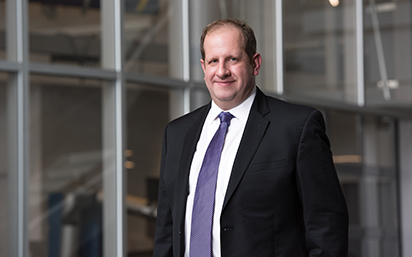
Federal grant to establish Rural Railroad Safety Center at K-State
The U.S. Department of Transportation’s Federal Railroad Administration has announced
the recipients of more than $326 million in grant funds under the Consolidated Rail
Infrastructure and Safety Improvements Program and the Special Transportation Circumstances
Program, for a wide variety of state and local railroad infrastructure projects.
The grants will fund 45 projects in 29 states, including just over $2.5 million for
a Rural Railroad Safety Center at Kansas State University.
“These investments in intercity passenger and freight rail will benefit surrounding
communities, make grade crossings safer and improve service reliability,” said U.S.
Transportation Secretary Elaine L. Chao.
Heading up the project will be Eric Fitzsimmons, assistant professor of civil engineering
in the Carl R. Ice College of Engineering. His collaborators are civil engineering
faculty members Robert Peterman, professor; and Christopher Jones and Stacey Kulesza,
associate professors.
“Our state’s economy depends on safe, reliable rail transportation to connect farmers
and businesses to the nation and deliver goods to market,” said U.S. Sen. Jerry Moran,
Kansas. “This grant to establish the Rural Railroad Safety Center at K-State will
help solidify Kansas as a leader in rail transportation and share the expertise of
officials at K-State with the rest of the country and industry. I was pleased to support
efforts to help secure this funding from the Department of Transportation, and look
forward to working alongside the university to build and grow this innovative program.”
Partner institutions include the University of Nebraska, Lincoln; University of Florida;
Pennsylvania State University, Altoona; and California State University, Chico.
“I often brag that the two things American agriculture does is produce more per acre
and get our goods to market cheaper and more reliably than any other country in the
world,” said U.S. Rep. Dr. Roger Marshall ’82, also from Kansas. “Rail transportation
is an important component of this, and I’m proud of the work done to support workforce
development and ensure future rail industry safety research through the establishment
of the Rural Railroad Safety Center at Kansas State University.”
The Rural Railroad Safety Center will have four strategic goals:
Conduct and promote railroad safety research selected by industry partners and the
Federal Railroad Administration.
Develop a comprehensive unified railroad education curriculum to be delivered at all
partnering universities.
Facilitate novel rail-focused outreach activities, including a bimonthly railroad
seminar and undergraduate summer research experiences.
Disseminate research results and technology transfer to be used by the railroad industry
via various outlets.
“I certainly want to thank the entire Kansas Congressional delegation for their support
and assistance in securing this grant,” Fitzsimmons said.
“By the end of the three-year grant period, it is our goal to have evolved into a
vibrant center for industry-relevant railroad research,” he said. “Additional educational
and outreach programs will be in place to train and develop a diverse workforce for
the railroad industry and our research outcomes will help ensure the future of the
rail industry is as safe and efficient as possible.”
Health and Human Sciences
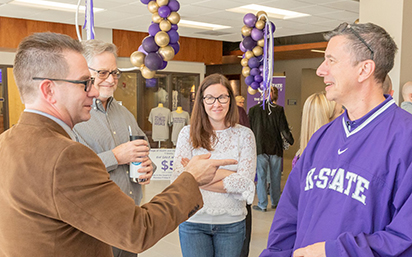
College hosts name change celebration
On Oct. 25, the College of Health and Human Sciences welcomed advisory board members,
faculty, staff, students, alumni and friends of the college to Justin Hall to officially
celebrate becoming the College of Health and Human Sciences.
During the event, the family and consumer sciences education program presented on
the history of the college, speaking as former deans and sharing their accomplishments
during their time with the college.
Please enjoy photos from our celebration.
Photos courtesy of Ray Martinez Photography
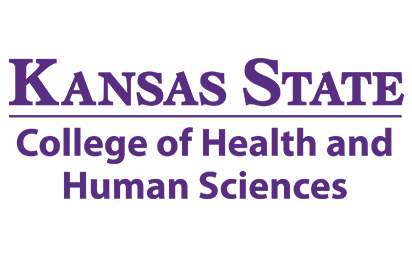
College of Health and Human Sciences recognizes outstanding seniors
The College of Health and Human Sciences is proud to recognize the 2019 Fall Commencement
outstanding senior award winners. This year’s outstanding senior award winners were
nominated by faculty and staff within each of their respective programs.
Three different award categories are available:
The Engagement Award is given to graduating seniors who have made exemplary contributions
that impact the well-being of the community or individuals in the community.
The Leadership Award is given to graduating seniors who have exhibited excellence
in leadership, recognizing them for their contributions to the campus, college, program
and professional organizations.
The Outstanding Research/Creative Activity Award is given to graduating seniors whose
research or creative activity has made a significant contribution to his or her field
of study.
Winners of the Engagement Award
Megan Herpich, kinesiology, Manhattan, Kansas; Taylor Rusche, early childhood education,
Seneca, Kansas; Jessie Carr, human development and family science, Pleasanton, Kansas;
Heather Wooden, dietetics, Virginia Beach, Virginia; Katharyn Roe, nutritional sciences,
Herington, Kansas; Kylie Horsch, nutritional sciences, Andale, Kansas; and Brooklyn
Plot, communication sciences and disorders, Salina, Kansas.
Winners of the Leadership Award
Jena Winkler, kinesiology, Sabetha, Kansas; Morgan Ziegler, personal financial planning,
Junction City, Kansas; Shelbi Emling, human development and family science, Chanute,
Kansas; Taylor Capko, gerontology (kinesiology), Port Arthur, Texas; Claire Tritschler,
nutrition and health, Bel Aire, Kansas; and Lexi Becker, communication sciences and
disorders, Wichita, Kansas.
Winners of the Research/Creative Inquiry Award
Timothy Cale Hepler, kinesiology, Olin, North Carolina; Shelbie McLain, human development
and family science, Shawnee, Kansas; and Alyssa Graber, communication sciences and
disorders, Wichita, Kansas.
Seniors will be presented their awards at the annual Graduation Honors and Student
Awards celebration on Friday, Dec. 13, in the K-State Student Union.
Technology and Aviation
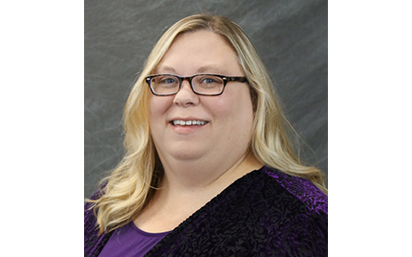
Alysia Starkey named CEO and dean of Kansas State University Polytechnic Campus
The interim CEO and dean of Kansas State University Polytechnic Campus has earned
the job permanently.
Alysia Starkey ’10, who has been serving as the interim leader of the campus in Salina
since July 2018, has been appointed its new CEO and dean by Charles Taber, K-State
provost and executive vice president.
“In her service as interim CEO and dean, Dr. Starkey has proven to be a strong and
effective leader of Kansas State Polytechnic,” Taber said. “Most notably, she has
led the strategic planning on Polytechnic’s aviation program, building community and
industry relationships that we will need to be successful.”
As the chief academic and administrative officer of Kansas State Polytechnic, Starkey
is responsible for providing leadership, management and support for all academic programs
and administrative units on the campus.
She’s charged with ensuring high-quality undergraduate and graduate experiences, continued
excellence and growth in Polytechnic’s research programs, and the recruitment and
retention of high caliber, diverse students. Effective fiscal stewardship and fundraising
efforts on behalf of the campus are also key parts of her job responsibilities.
“Kansas State Polytechnic is a special place and I am grateful for the opportunity
to serve as CEO and dean,” Starkey said. “I am excited to continue working with students,
faculty, staff and alumni to advance our mission and enhance our capabilities to meet
the educational and workforce needs of the future.”
Before her appointment as interim CEO and dean, Starkey served as associate dean of
academics at Kansas State Polytechnic. She has in-depth experience in the leadership,
management and support needs of all aspects of the school, including student success,
academic programs, faculty and budgetary matters.
She joined Polytechnic in June 2002 as a technical services/automation coordinator
and assistant professor. She was promoted to library director and associate professor
in 2007, and named assistant dean of academics and distance education and director
of libraries in 2010. She served as assistant dean of continuous improvement from
2012-14 before being named associate dean of academics/undergraduate studies and promoted
to full professor in 2014.
She gained the additional duties of acting director for the School of Integrated Studies
in June 2016. In October 2017, Starkey was named associate dean of academics and acting
director of professional education and outreach.
Starkey earned a doctorate in curriculum and instruction from K-State; a master’s
in library science from the University of North Texas; a bachelor’s in psychology
from Fort Hays State University; and an associate degree in social work from Colby
Community College.
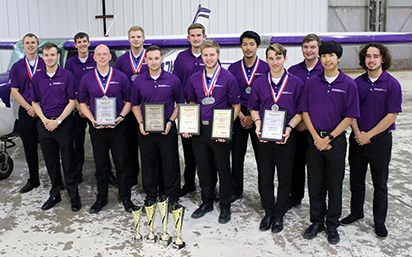
Kansas State Polytechnic Flight Team second at regional competition, team captain named top pilot
The flight team at Kansas State University Polytechnic Campus is advancing to nationals
in the spring after placing second in its region and earning several individual honors
during an annual collegiate aviation competition.
Along with six other schools, the Kansas State Polytechnic Flight Team attended Region
VI of the National Intercollegiate Flying Association Safety and Flight Evaluation
Conference, also known as NIFA SAFECON.
Conducted Oct. 16-19 at the Council Bluffs Municipal Airport in Council Bluffs, Iowa,
the competition consisted of both ground and air events with participants having the
opportunity to win individual awards and receive team placings — which mean a guaranteed
spot at nationals for the top three teams.
With a second-place overall finish, the Kansas State Polytechnic Flight Team will
compete nationally in May 2020. Additionally, Kansas State Polytechnic scored more
than 20 top 10 individual placings, and team captain Marc Hinnen, Edwardsville, Kansas,
earned the coveted Top Pilot award.
“We feel really good about our performance at regionals because it demonstrates our
commitment and self-motivation,” Hinnen said.
Ten ground and flight events make up NIFA SAFECON. They range from participants determining
different types of aircraft from ambiguous photos to attempting to hit a ground target
from the air to landing a plane as close as possible to a specific line painted on
the runway.
“This is such a close-knit group that truly cares for one another; they push each
other, encourage each other and look out for one another,” said Julie Rowe, student
programming and career services coordinator at Kansas State Polytechnic, who serves
as the team’s staff adviser. “While aviation is not my specialty, you don’t have to
be an expert to know they love what they do. It’s been inspiring to watch how hard
they work.”
View the full results from the competition.
Veterinary Medicine

Partnership with Hill’s Pet Nutrition adds dimensions to K-State veterinary college
Healthy pets and nutrition education are key components of a partnership announced
a year ago between the College of Veterinary Medicine (CVM) at Kansas State University
and Hill’s Pet Nutrition.
One of the highlights of the partnership has included the addition of an internship
dedicated to nutritional service and education at the Veterinary Health Center, which
serves as the college’s veterinary hospital. Part of this internship includes the
establishment of an obesity clinic for small animal veterinary patients.
“The objective of the K-State Obesity Clinic is to provide a structured program to
help overweight dogs and cats reach their ideal body weight,” said Dr. Elizabeth Davis
’04, head of Clinical Sciences and interim director for the Veterinary Health Center.
“The program offers six-month blocks of enrollment that include regular veterinary
consults — rechecks will occur every two to four weeks depending upon rates of weight
loss.”
Dr. Vincent Michels was hired as the Veterinary Health Center’s primary care/nutrition
intern.
“Dr. Michels will be overseeing the majority of the patients enrolled in the program,”
Davis explained. “For the more challenging cases, he will be able to consult with
two of Hill’s American College of Veterinary Nutrition board certified clinical nutritionists
who are also adjunct faculty of the Department of Clinical Sciences.”
This past summer, Hill’s Pet Nutrition hosted a summer internship for current veterinary
student Abby Ostronic, who is from Lenexa, Kansas, and is currently in her third year
of studies at the CVM.
“Hill’s was an incredible experience for me as I would recommend it to any other veterinary
student in the future,” Ostronic said. “I got the ability to see what daily life is
like as an industry veterinarian and the immense number of roles that a veterinarian
can have whether it is in marketing, education, finance, product development, research
or many other areas that we are not exposed to during veterinary school. This internship
really made me feel as though even though I was only at the company for three months
I was able to make a big difference in their education protocol as well as Hill’s
has forever changed my perspective of possibly working as an industry veterinarian
in the future.”
“It was my pleasure to have Abby Ostronic as the first Global Professional Veterinary
Affairs Summer Intern at Hill’s Pet Nutrition,” said Dr. Mark Brady, senior manager
professional engagement.
Another aspect of the partnership includes the establishment of a new continuing education
symposium to be held Dec. 7 at Frick Auditorium in Mosier Hall at the K-State CVM.
This symposium features experts from K-State’s College of Veterinary Medicine, as
well as professionals from the industry who will be lecturing on small animal nutrition. This
symposium will include complimentary registration to professionals in the field who
are looking to learn more about educating and communicating with pet owners to have
healthy animals. Lunch and snacks will be provided.
Photo: Abby Ostronic, third-year student, and Dr. Vincent Michels, current VHC intern,
participate in opportunities supported by Hill’s Pet Nutrition. (Courtesy photo)
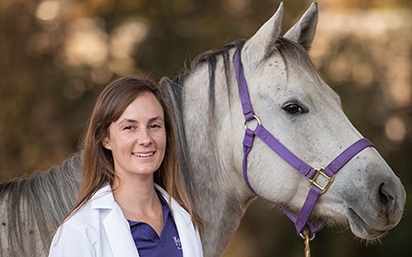
Veterinary student receives prestigious equine medicine scholarship
Five veterinary students across the country received a $5,000 scholarship from Merck
Animal Health, administered by the American Association of Equine Practitioners (AAEP)
Foundation. Among the recipients is Haydan Vosburgh, a fourth-year student at the
Kansas State University College of Veterinary Medicine.
“I am extremely grateful to have been awarded this scholarship from Merck Animal Health
and the AAEP Foundation,” Vosburgh said. “This award will help alleviate some of my
financial burden from veterinary school and allow me to focus on pursuing my passion
for equine medicine! I am excited to start the next chapter of my veterinary career
and would like to thank Merck and the AAEP Foundation for providing this wonderful
opportunity!”
The Merck Animal Health scholarship recognizes promising veterinary students committed
to a career in equine medicine.
“We are incredibly proud to support these five future equine veterinary students through
our ongoing partnership with the AAEP and the AAEP Foundation,” said Dr. D. Craig
Barnett, Merck Animal Health director of equine technical services. “These students
are exceptional leaders and I’m confident they will help move our mission forward
by advancing the science of healthier animals in the years to come.”
The five recipients of the 2019 Merck Animal Health Scholarship will be presented
with their awards on Dec. 9 at the AAEP’s 65th Annual Convention in Denver, Colorado.
— Article by Piper Brandt
School of Applied and Interdisciplinary Studies

Save the date: Urban Food Systems Symposium is June 4-6, 2020
The Urban Food Systems Symposium hosted by Kansas State University will be June 4-6, 2020, at the Marriott Plaza Hotel
in downtown Kansas City, Missouri. The symposium will also offer a pre-symposium workshop
on June 3.
The symposium will bring together researchers, not-for-profit administrators, community
organizers, Extension professionals, students and others to share and gain knowledge
on urban food systems and agriculture and their role in global food security. The
focus is on food production and distribution in cities; climate change; urban planning
and development; nutrition and human health; food policy and education; and community
and economic development.
Henk de Zeeuw — international secretariat of the RUAF Foundation and an expert in
participatory research and Extension, multistakeholder policy development and planning,
and institutional development — will give the keynote address. Other speakers include:
- Becca Jablonski, assistant professor and Extension economist in food systems at Colorado State University
- Elizabeth Mitcham, director of the Horticulture Innovation Lab at the University of California, Davis
- Chuck Rice, university distinguished professor of soil science at K-State
Mark Winne, a community food systems and food policy activist, writer and trainer,
will be the June 4 dinner speaker.
Attendees will have the opportunity to hear an array of additional breakout presentations.
This year’s topics include nutrition and food security; climate change; food production
and distribution; community engagement; urban planning and development; international
perspectives; economic development; and food policy and advocacy. Additionally, submissions are now being accepted for $500 travel scholarships for
both students and urban food systems professionals. Eligibility details and application
forms are available on the Urban Food Systems Symposium website. Dec. 20 is the application deadline for scholarships. Recipients will be announced
on Feb. 1, 2020. Travel scholarships for urban food systems professionals are funded
through North Central SARE.
Additionally, submissions are now being accepted for $500 travel scholarships for
both students and urban food systems professionals. Eligibility details and application
forms are available on the Urban Food Systems Symposium website. Dec. 20 is the application deadline for scholarships. Recipients will be announced
on Feb. 1, 2020. Travel scholarships for urban food systems professionals are funded
through North Central SARE.
The Urban Food Systems Symposium is an excellent opportunity to share and promote
your products or services. With over 200 attendees expected from all over North America,
sponsorship will be noticed by participants from all areas of the food systems industry.
Sponsorship levels range from Platinum to Supporter with various levels of benefits
and visibility to fit any organization. If you’re interested in partnering with us
in implementing this exciting event and organizing a high-quality symposium, visit
our sponsor page on our website.
Find more information about the symposium, including applications for travel scholarships.

First U.S. certificate program in animal health regulatory affairs now available
Kansas State University’s Olathe campus is now offering a premier graduate certificate
designed for the regulatory affairs sector of the animal health industry.
The Animal Health Regulatory Affairs Graduate Certificate is a 15-credit hour program
that combines the knowledge of animal science and veterinary medicine with skills
needed to navigate governmental processes and regulations throughout the product lifecycle.
The certificate is based on industry input and tailored to industry needs.
K-State Olathe’s Animal Health Regulatory Affairs Graduate Certificate is the first
graduate certificate in the U.S. to focus solely on animal health regulatory affairs.
Recruiters for the animal health industry frequently cite the large and ever-growing
need for highly educated professionals who specialize in regulatory affairs — particularly
as the industry continues to discover new pharmaceuticals, therapeutics and products
that improve animal health.
This continuous need for more talent has led to companies investing significant resources
and time into developing “homegrown” talent, said Gary Anderson ’79, director of the
Animal Health and Food Safety Institute at K-State’s Olathe campus.
This “homegrown” education has led to most employees specializing in just one of the
three federal agencies that oversee animal health products rather than having a robust
knowledge about the regulations and practices required by all three federal agencies.
“Our program seeks to rectify that knowledge gap that comes with this siloed grooming
process,” Anderson said. “Among the regulatory knowledge taught, three separate courses
focus on the Food and Drug Administration, Environmental Protection Agency and the
U.S. Department of Agriculture. This means graduates exit with not only broader and
deeper knowledge about regulatory affairs, but they also are more familiar with the
each of the three federal agencies that oversee animal drug, vaccine and pesticide
development.”
To ensure the curriculum is relevant and applicable, courses are taught by faculty
who have industry backgrounds. Courses also incorporate industry professionals with
regulatory experience to lead in-depth discussions on key topics.
The certificate is open to professionals from all backgrounds, not just those in animal
health.
Learn more about the Animal Health Regulatory Affairs Graduate Certificate.

